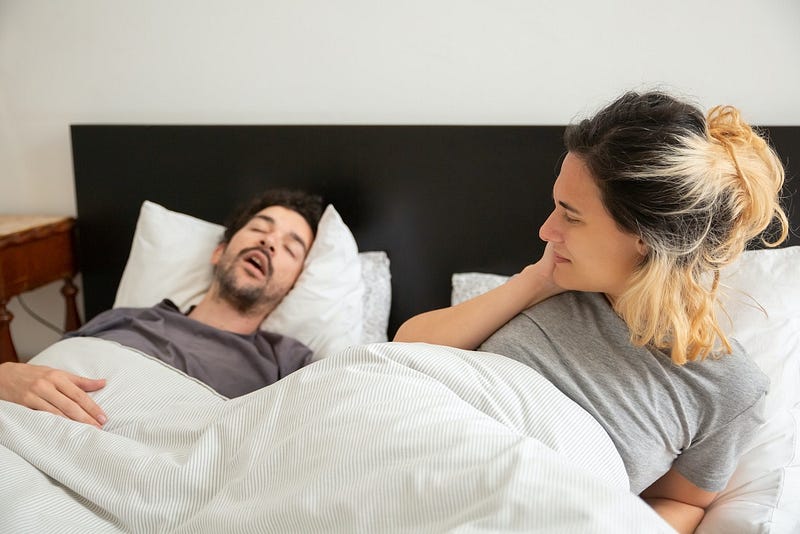Understanding Snoring: When to Seek Help and What It Means
Written on
The Nature of Snoring
Almost everyone experiences snoring at some point, including pets. While it may seem harmless, excessive snoring can disrupt sleep and indicate underlying health issues. Research suggests that problematic snoring can be a sign of health risks, as it significantly affects sleep quality.

A recent study involving 300,000 middle-aged adults in the U.K. revealed a troubling connection between sleep disturbances and cardiovascular health. Those with sleep-related breathing disorders, like sleep apnea, face a shorter lifespan free from heart disease. Even minor sleep issues, such as simple snoring or daytime drowsiness, can result in a two-year reduction in cardiovascular health.
The researchers concluded that snoring and sleep difficulties might indicate future health concerns.
Moderate Snoring: When to Worry
If you or your partner experiences mild snoring, there's generally no cause for alarm. Dr. Andrew Wellman, director of the Sleep Disordered Breathing Lab at Brigham and Women’s Hospital, asserts that mild snoring is more of a social nuisance than a health problem.
However, heavy snoring can hinder deep sleep, which is vital for mental and physical restoration. This condition can also lead to or exacerbate existing health issues, creating a negative feedback loop.
Research published in the journal Sleep found that habitual snorers are more sedentary, spending an average of 36 additional minutes each day inactive compared to non-snorers. Those diagnosed with sleep apnea reported an even higher increase of 44 minutes. The exact relationship between snoring and sedentary behavior remains unclear, but it is likely reciprocal.
Understanding Serious Snoring Issues
Routine snoring differs significantly from sleep apnea, a severe condition characterized by pauses in breathing during sleep. This condition can disrupt sleep multiple times per hour and is often caused by soft tissue obstructing the airway. It is more prevalent in men and typically begins after age 50.
Estimates suggest that between 80 million and 150 million Americans have some form of sleep apnea. Many cases go undiagnosed due to mild symptoms, but those affected may not even be aware of their condition.
To identify sleep apnea, look for signs of excessive daytime sleepiness and other symptoms such as:
- Morning headaches
- Sore throat upon waking
- Chest pain at night
- Sexual dysfunction
- Night sweats
The Rising Concern of Sleep Apnea
Experts attribute the increasing incidence of sleep apnea to various factors, with obesity being the most significant risk factor. Dr. Susheel Patil emphasizes the importance of lifestyle changes to mitigate symptoms.
If you suspect that snoring is affecting your sleep quality, observe for signs like grogginess and difficulty concentrating.
Home Remedies for Snoring
To alleviate mild snoring or sleep apnea, consider common strategies such as reducing alcohol intake, maintaining a healthy diet, exercising regularly, and ensuring exposure to natural light. Additionally, sleeping on your side rather than your back can be beneficial.
If lifestyle adjustments are ineffective, seek professional help for a comprehensive diagnosis. While surgery may be an option for severe cases, it is typically not the first line of treatment.
For those affected by a partner's snoring, earplugs can be a simple yet effective solution to preserve harmony in relationships.
Chapter 2: Additional Resources
Explore these helpful resources to deepen your understanding of sleep-related issues:
The first video, "When is Snoring in Children a Concern?" addresses the potential health implications of snoring in children, providing insights for parents.
The second video, "Wake up to the health risks of heavy snoring," outlines the dangers associated with excessive snoring and the importance of addressing these issues promptly.
Your support makes my health and wellness writing possible. You can sign up for emails when I publish on Medium, or join Medium to directly support me and gain full access to all Medium stories, get my health news briefs on Mastodon, or check out my book: Make Sleep Your Superpower: A Guide to Greater Health, Happiness & Productivity (paperback or Kindle version). — Rob